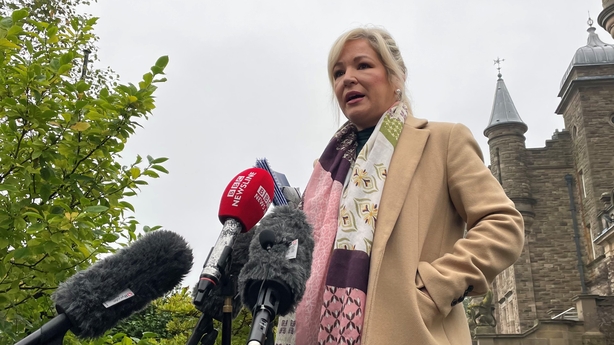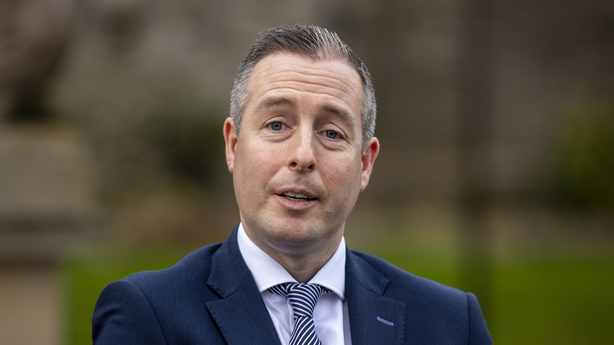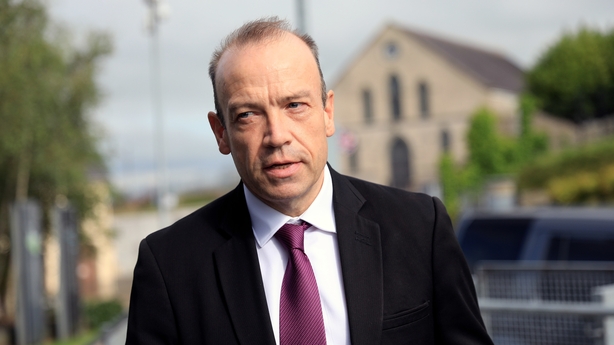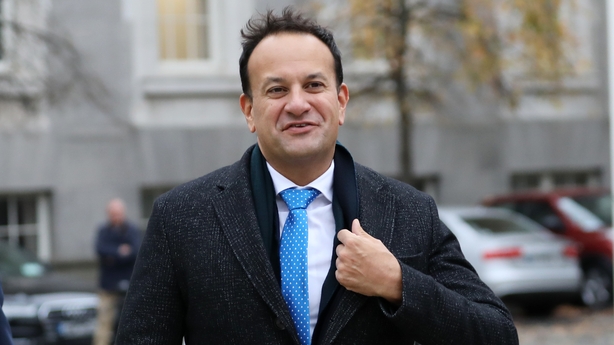The DUP has been warned that crashing devolution at Stormont permanently could result in the Irish Government having a greater say in the affairs of Northern Ireland.
There is a growing consensus that a fresh Stormont election is now highly likely before Christmas, but also agreement that it is highly unlikely to break the stalemate over devolution.
If there is an election and the Stormont parties fail to reach an agreement to go back into power sharing by a minute past 12am next Friday morning, the Northern Ireland civil service will take over the running of all government departments.
The four largest parties entitled to have ministers in the Stormont Executive met Jayne Brady, the head of the civil service, this morning.
If power sharing is not restored, she and her senior officials will take control.
Speaking after the meeting, Sinn Féin's leader in Northern Ireland and Stormont's First Minister designate Michelle O'Neill said the public were being held to ransom by the DUP.
"Everything will fall next Friday," she said.
"There'll be no ministers in place to take decisions to actually help people through the cost-of-living crisis.
"There'll be no ministers in place to take the daily decisions that you're elected to take, so it's not good enough for the public that we're being denied, I suppose we're being denied democracy by the DUP at this time."

With no Stormont Executive ministers in place following a new election, the parties would have up to a maximum of 24 weeks to agree to go back into power sharing.
In the absence of agreement at the end of that period, the Stormont Assembly would effectively be mothballed with civil servants in full control.
The Alliance Party and Ulster Unionists today said they are concerned about the possible long-term implications, as they do not believe the alternative to power sharing will be direct rule from London, but that Dublin could have a greater input.
Strand 3 of the Good Friday Agreement-established mechanisms for the two governments to work together to promote bilateral co-operation at all levels on all matters of mutual interest.
"I don't think it will be as simple as just going straight forward to direct rule, I don't think that that's on the cards," said Alliance leader Naomi Long.
"I think that we would be talking about a form of direct rule that would involve Irish participation and not just direct rule from Westminster."
Ulster Unionist leader Doug Beattie shares that assessment.
"I'm really concerned, if we look at the New Decade New Approach document that got this government, the Executive, up and running again, that was a document that was penned by London and Dublin, so they had an equal say," he said.
"If people think there's a utopia out there, that it's just going to be direct rule from London, then they're mistaken, they're politically illiterate."
The DUP says it remains committed to devolution, but only if the dispute over the Northern Ireland Protocol is resolved to its satisfaction.

With party leader Jeffrey Donaldson in London, its former Stormont First Minister Paul Givan attended today's meeting.
When asked to respond to the claims by the Alliance and Ulster Unionist leaders, he said there must be "coalition consensus type politics" for power sharing to work.
"If devolution ultimately isn't here, we should all be concerned about what that means for Northern Ireland, because we know that it's through these institutions that people have a political voice, they can take their issues forward and they can be heard," he added.
"In the absence of that, I don't think direct rule is good for the people of Northern Ireland in any shape or form, so I think everybody should be concerned about the prospects of direct rule."
Time is running out for power sharing to be restored, with a legal obligation on the Northern Secretary to trigger a Stormont election if it does not happen by 28 October.
Given the turmoil within the British Government, Paul Givan said it will now take a "miracle" to get power sharing at Stormont back up and running by next Friday to avoid an election before Christmas.
One thing the four parties that attended today's meeting - Sinn Féin, the DUP, Alliance and Ulster Unionists - all agreed on was the fact that the ongoing political chaos in Westminster is likely to mean efforts by the UK to resolve the protocol dispute with the EU are very low on its current list of priorities.

It is not yet clear what the implications of the resignation of Liz Truss as British Prime Minister might have on what happens next at Stormont.
Northern Secretary Chris Heaton-Harris has said he will make the decision to trigger a fresh election next Friday, but that is now also the day the identity of the new leader of the Conservative Party and the UK's latest prime minister is to be revealed.
That could potentially delay the decision on the date for an Assembly election as the new prime Minister may want to have a say.
It is also possible that the new occupant of Number 10 might decide to have a reshuffle and appoint a new Secretary of State, who might take a different view and not opt for a new poll before Christmas.
Some senior civil servants are concerned that the reverse could be the case.
"It's entirely possible that with all the mayhem they are going to have to deal with at Westminster, the new prime minister won't have the time or inclination to give much thought to Northern Ireland and we could find ourselves sleepwalking into an election," said one.
In a statement, a spokesperson for the Northern Ireland Office said: "The Secretary of State's focus remains on the restoration of the Executive as soon as possible.
"Legislation is clear that if an Executive is not formed by 28 October, the Secretary of State for Northern Ireland will come under a legal duty to call further elections to the Northern Ireland Assembly."
'Clear desire' by UK for agreement on NI Protocol - Varadkar

Meanwhile, Tánaiste Leo Varadkar said there was a clear desire by the UK government to come to an agreement on the Northern Ireland Protocol rather than to have a confrontation with Ireland or the European Union.
Speaking in Brussels ahead of a meeting of the European People's Party, Mr Varadkar said, following his meetings yesterday with UK Deputy Prime Minister Therese Coffey and Foreign Secretary James Cleverly, as well as Labour leader Keir Starmer, that there was "goodwill" on the UK side towards a negotiated agreement.
He said a future Labour government would want a closer relationship with the European Union, although that would not involve rejoining the single market or customs union.
"For now and for the foreseeable future the British government is led by prime minister Truss and it's a Conservative Party government," he said.
"It’s our responsibility to work with them and try to secure an agreement on the protocol that above all works for the people of Northern Ireland.
"The political situation is unsettled at the moment. We’ve gone through periods of that in our own country as well, and when things are unsettled it’s hard to focus on all the different files that you may have to deal with at any particular time, but really internal politics within any country isn’t really something we should get involved in.
"What we have to do is work with the people who are in charge, and prime minister Truss is in charge."
Additional reporting Tony Connelly, PA







